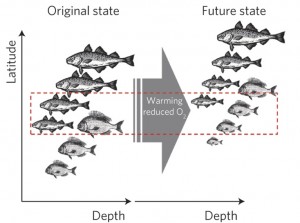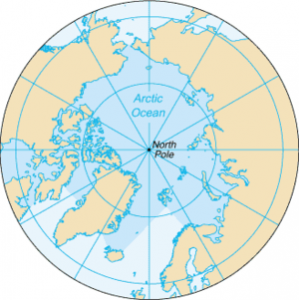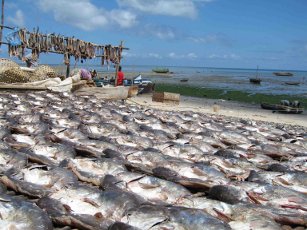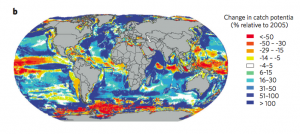 A new study out this week shows how the effect of climate change can further impact the economic viability of current fisheries practices.
A new study out this week shows how the effect of climate change can further impact the economic viability of current fisheries practices.
“Fisheries are already providing fewer fish and making less money than they could if we curbed overfishing,” says Rashid Sumaila, principal investigator of the Fisheries Economics Research Unit at UBC, member of the Sea Around Us Project, and lead author of the study. “We could be earning interest, but instead we’re fishing away the capital. Climate change is likely to cause more losses unless we choose to act.”
Partly supported by the Pew Charitable Trusts, National Geographic, the World Bank and U.S. National Oceanic and Atmospheric Administration, the study is a broad view of the impact of climate change on fisheries and their profitability. It was published online this week in the journal Nature Climate Change.
Over the last century the ocean has become warmer and more acidic. Other human-led factors, such as pollution and overfishing, have also been hard on marine species. With ocean warming, many species will move further towards the poles and into deeper water.
While fisheries in a few regions, such as the far north, may benefit from climate change, many other regions, particularly those in the tropics, can expect losses in revenues. Regional examples can help inform what could happen globally. For example, the reduction in landings of pelagic fisheries in Peru as a result of changes in sea surface temperature during the 1997-1998 El Niño event caused more than US$26 million of revenue loss.
“Changes in temperature and ocean chemistry directly affect the physiology, growth, reproduction and distribution of these organisms,” says William Cheung, associated faculty of the Sea Around Us Project. “Fish in warmer waters will probably have a smaller body size, be smaller at first maturity, with higher mortality rates and be caught in different areas. These are important factors when we think of how climate change will impact fisheries.”
“This study provides an early glimpse of how climate change might impact the economics of fishing,” says Sam Herrick, a NOAA scientist and co-author. “We must continue to study how climate change, combined with other factors, will affect marine ecosystems and the productivity of fishery resources.”
Biologically, maintaining more abundant populations can help increase fish’s capacity to adapt to environmental change. Curbing overfishing is crucial to making marine systems more robust and ready for changes that are already underway.
“This study highlights the potential negative impacts of climate change on the profitability of fisheries,” said Vicky Lam, UBC graduate student and co-author. “The next generation of scientists must put more effort on exploring ways to minimize the impacts of climate change.”
Fish stocks will also be more robust to climate change if the combined stresses from overfishing, habitat degradation, pollution runoff, land-use transformation, competing aquatic resource uses and other anthropogenic factors are minimized
“We have to remember that the effect of climate change on the marine environment will occur alongside the impacts on land,” says Daniel Pauly, principal investigator of the Sea Around Us Project and co-author. “It will not be easy to divert resources from one sector to help another sector. This is why a strong governance system is needed – to temper the losses on the sectors that are worst hit.”
“Governments must be anticipatory, rather than reactive,” says Sumaila. “We all need to think more of the future while we act now.”
For more information, see this summary provided by Pew.
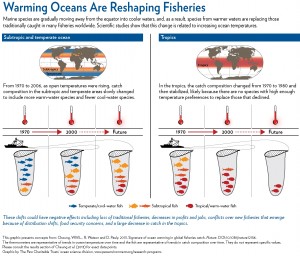 A new paper from the Sea Around Us Project published in the journal Nature reveals that warmer ocean temperatures are driving marine species towards cooler, deeper waters, and this in turn, has affected global fisheries catches.
A new paper from the Sea Around Us Project published in the journal Nature reveals that warmer ocean temperatures are driving marine species towards cooler, deeper waters, and this in turn, has affected global fisheries catches. 

